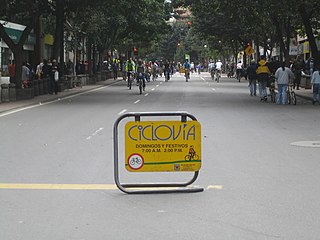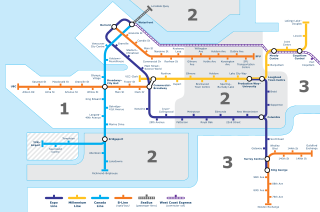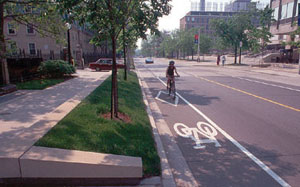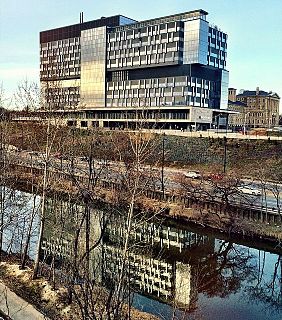Related Research Articles

In social science, the term built environment, or built world, refers to the human-made surroundings that provide the setting for human activity, ranging in scale from buildings to parks. It has been defined as "the human-made space in which people live, work, and recreate on a day-to-day basis."

King's Highway 401, commonly referred to as Highway 401 and also known by its official name as the Macdonald–Cartier Freeway or colloquially as the four-oh-one, is a controlled-access 400-series highway in the Canadian province of Ontario. It stretches 828 kilometres (514 mi) from Windsor in the west to the Ontario–Quebec border in the east. The part of Highway 401 that passes through Toronto is North America's busiest highway, and one of the widest. Together with Quebec Autoroute 20, it forms the road transportation backbone of the Quebec City–Windsor Corridor, along which over half of Canada's population resides and is also a Core Route in the National Highway System of Canada. The route is maintained by the Ministry of Transportation of Ontario (MTO) and patrolled by the Ontario Provincial Police. The speed limit is 100 km/h (62 mph) throughout its length, with the only exceptions the posted 80 km/h (50 mph) limit westbound in Windsor and in most construction zones.

Glen R. Murray is a Canadian politician and urban issues advocate. He served as the 41st Mayor of Winnipeg, Manitoba from 1998 to 2004, and was the first openly gay mayor of a large North American city. He subsequently moved to Toronto, Ontario, and was elected to the Legislative Assembly of Ontario as a Liberal Member of Provincial Parliament (MPP) for Toronto Centre in 2010, serving until 2017.

Bicycle transportation planning and engineering are the disciplines related to transportation engineering and transportation planning concerning bicycles as a mode of transport and the concomitant study, design and implementation of cycling infrastructure. It includes the study and design of dedicated transport facilities for cyclists as well as mixed-mode environments and how both of these examples can be made to work safely. In jurisdictions such as the United States it is often practiced in conjunction with planning for pedestrians as a part of active transportation planning.
The Toronto Transportation Services, formerly Metro Roads and Works, is a division of the City of Toronto government. It is responsible for all public and non-provincially maintained roadways in Toronto, Ontario, Canada.
Cycling advocacy consists of activities that call for, promote or enable increased adoption and support for cycling and improved safety and convenience for cyclists, usually within urbanized areas or semi-urban regions. Issues of concern typically include policy, administrative and legal changes ; advocating and establishing better cycling infrastructure ; public education regarding the health, transportational and environmental benefits of cycling for both individuals and communities, cycling and motoring skills; and increasing public and political support for bicycling.

Ciclovía, also ciclovia or cyclovia, is a Spanish term that means "cycleway", either a permanent bike path or the closing of certain streets to automobiles for cyclists and pedestrians, a practice sometimes called open streets.

A bicycle boulevard, sometimes referred to as a neighborhood greenway, neighborway, neighborhood bikeway or neighborhood byway is a type of bikeway composed of a low-speed street which has been "optimized" for bicycle traffic. Bicycle boulevards discourage cut-through motor-vehicle traffic but allow local motor-vehicle traffic. They are designed to give priority to bicyclists as through-going traffic. They are intended as a low-cost, politically popular way to create a connected network of streets with good bicyclist comfort and/or safety.

Transportation in Vancouver, British Columbia has many of the features of modern cities worldwide. Unlike many large metropolises, Vancouver has no freeways into or through the downtown area. A proposed freeway through the downtown was rejected in the 1960s by a coalition of citizens, community leaders and planners. This event "signalled the emergence of a new concept of the urban landscape" and has been a consistent element of the city's planning ever since.

Metrolinx is a Crown agency that manages and integrates road and public transport in the Golden Horseshoe region, which includes the cities of Toronto and Hamilton and area, in the province of Ontario in Canada. Headquartered in Union Station in Toronto, the organization was created by the Government of Ontario as the "Greater Toronto Transportation Authority" on April 24, 2006. It adopted "Metrolinx" as its brand name in 2007 and legally changed its name to Metrolinx in 2009.

Halifax, Nova Scotia, is a major multi-modal transportation centre for freight and passengers in Atlantic Canada.

Complete streets is a transportation policy and design approach that requires streets to be planned, designed, operated, and maintained to enable safe, convenient and comfortable travel and access for users of all ages and abilities regardless of their mode of transportation. Complete Streets allow for safe travel by those walking, cycling, driving automobiles, riding public transportation, or delivering goods.

The California Bicycle Coalition (CalBike) is a 501(c)(4) nonprofit organization based in Sacramento and Oakland that advocates for more bicycling in California. The California Bicycle Coalition Education Fund is a related 501(c)(3) organization that conducts solely charitable functions, mostly by supporting CalBike. Founded in 1994, the California Bicycle Coalition's mission is to "enable more people to bicycle for the health, safety, and prosperity of all Californians." The California Bicycle Coalition has adopted an official goal to double the amount of bicycling in California by 2017 and triple it by 2020.
The Toronto-Niagara Bike Train is an award-winning initiative in Southern Ontario allowing cyclists to travel by train on Via Rail to destinations across Ontario including Toronto, Niagara Falls, St. Catharines, and North Bay, as well as the city of Montreal in Quebec. 2009 saw an expansion of the Bike Train Initiative, with new routes and more weekends of service.

Cycling in Toronto, Ontario, Canada, like many North American cities, has slowly been improving its cycling infrastructure. The number of cyclists has been increasing progressively, particularly in the core. As cycling conditions improve, a cycling culture has grown and alternatives such as automobiles are seen as less attractive. The politics of providing resources for cyclists, particularly dedicated bike lanes, has been contentious in the 2010s.

The National Association of City Transportation Officials (NACTO) is a coalition of the Departments of Transportation in North American cities.

Cycling in Canada is experienced in various ways across a geographically huge, economically and socially diverse country. Among the reasons for cycling in Canada are for practical reasons such as commuting to work or school, for sports such as road racing, BMX, Mountain bike racing, freestyle BMX, as well as for pure recreation. The amount and quality of bicycle infrastructure varies widely across the country as do the laws pertaining to cyclists such as bicycle helmet laws which can differ by province.

Bridgepoint Active Healthcare is a complex care and rehabilitation hospital in Toronto. It is a member of the Sinai Health System and affiliated with the University of Toronto.

Taiwanese Canadian Association of Toronto (TCAT), the largest general-purpose all-ages Taiwanese organization in the Greater Toronto Area, was established back in 1963 and later registered as a non-profit organization in the Province of Ontario in 1975.

The Northern Strand Community Trail, also known as the Bike to the Sea Trail, is a 10-mile bicycle path and walking trail project which connects the cities of Everett, Malden, Revere, and Saugus, along the former Saugus Branch Railroad of the Boston & Maine Railroad. The trail is part of the East Coast Greenway, a project planning to connect almost 3,000 miles of trail from Calais, Maine to Key West, Florida. The path has been planned by Bike to the Sea, a non-profit cycling advocacy group, with help from the surrounding cities.